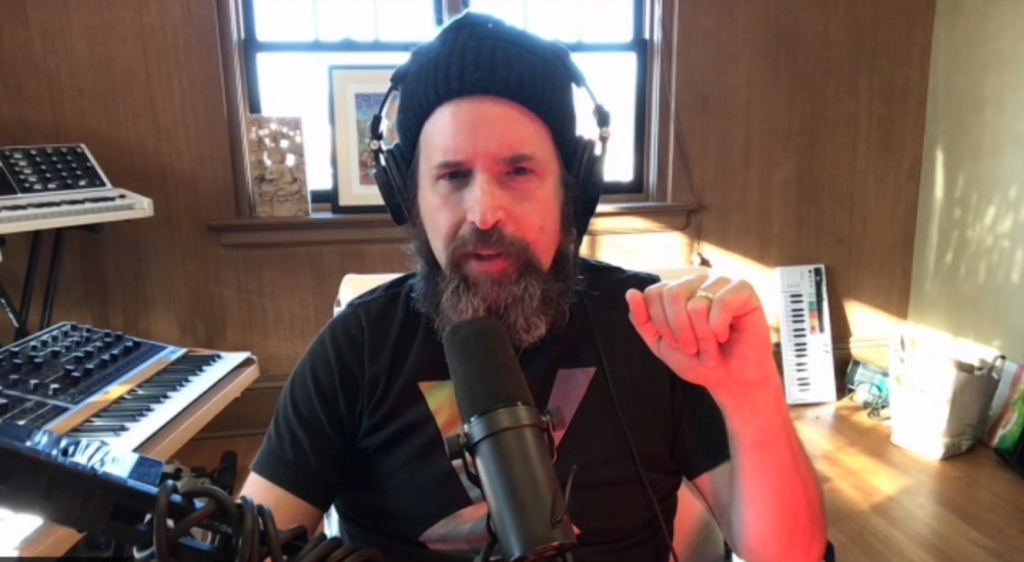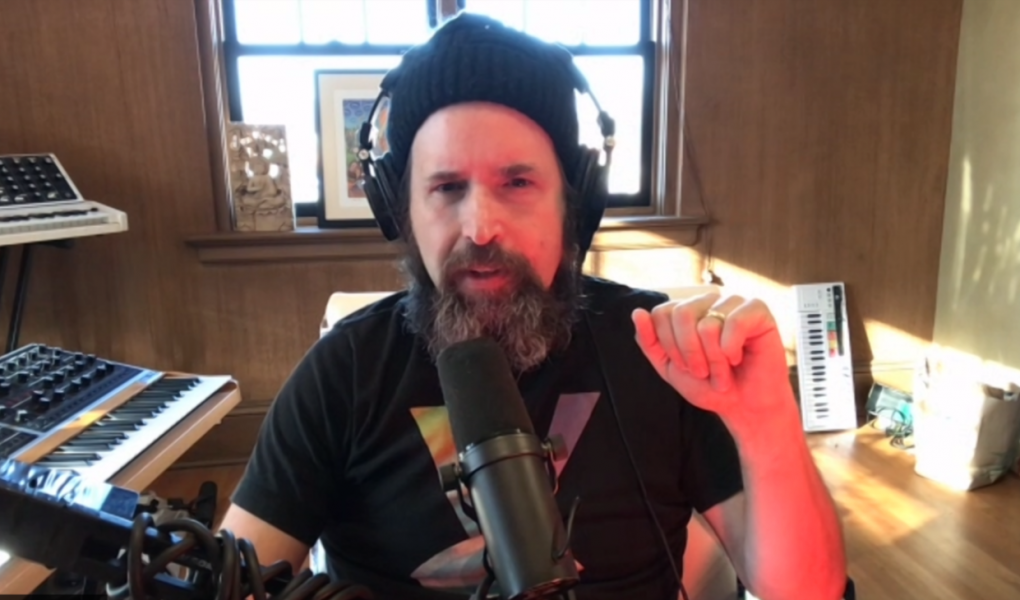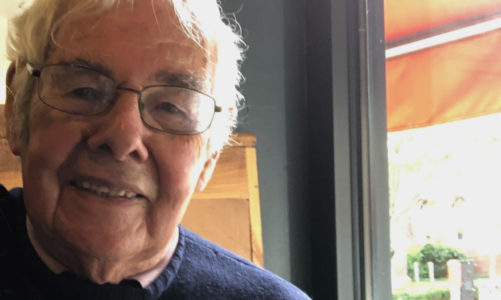
Duncan Trussell is a podcaster, stand-up comedian, musician, writer, and actor. He hosts the Duncan Trussell Family Hour, where he interviews Buddhist teachers, comedians, psychedelic drug advocates, and other countercultural figures. Trussell is the co-creator of the Netflix series The Midnight Gospel, which turns episodes of his podcast into animated explorations of a simulated reality. His comedy appearances include Curb Your Enthusiasm, Funny or Die’s Drunk History, and Comedy Central’s This is Not Happening. He has worked with Adventure Time auteur Pendleton Ward, podcaster Joe Rogan, and guru Ram Dass, among others.
Charles Alaimo: In a lot of your podcast conversations with spiritual leaders, you frame yourself as a student along with the listener rather than a teacher yourself. Recently Jack Kornfield called you “a public neurotic.” How do you still see yourself as an unexceptional person, even after all your spiritual work?
Duncan Trussell: I am an actual neurotic person. I’m in therapy. I’m in marriage counseling; I’m working on all this stuff from my past and trying to become a better dad. I’m not just doing that through meditation, but also Western psychotherapy, which is a fantastic way to work with your mind.
If you’re not careful when you’re hanging out with these amazing people like Ram Dass or Jack Kornfield, you can accidentally inflate yourself. The Tibetan Lama Chogyam Trungpa Rinpoche points out this terrible possibility in his book Magic and Cynicism. If you’re not careful, spiritual practice stops being what it should be: a systematic dissolution of your false ego. It’s about dissolving into a unit of consciousness. Your perception of your identity should stop being something permanent and important. But it can have the opposite effect – it’s like the ultimate trickery. You think you’re getting enlightened, but you’re just getting increasingly crystallized as a spiritual being.
Tell me about your experiences with Chogyam Trungpa Rinpoche. I grew up in Boulder, where he founded the Buddhist Naropa University, so I’ve been surrounded by his legacy my entire life. But how has he influenced you?
My meditation teacher, David Nichtern, was one of his students. So my encounter with him has been through David, who’s amazing. It’s really a very, very, frustratingly simple meditative practice. That kind of simplicity has been very useful and potent for me. And then of course, through his books, which are just amazing. His writing is so weird and beautiful and infuriating.
My first encounter with him was actually before I started working with David, through just some book I picked up at a thrift store. I thought he seemed like the biggest asshole on earth. I was infuriated with his analysis of this formation that appears in seekers: If you get high enough, or meditate enough, when you come down, you’ll say, “I don’t have words to describe what has happened.” And in this passage he says, “If you think that you have encountered something miraculous and you don’t have words for it, that’s like taking candles and placing them at the altar of your confusion and worshipping it.” It’s bundling enlightenment with confusion. But back then, I’d been doing that all the fucking time, saying like, “Oh, it’s bigger than words, I can’t say what it is.” So I felt called out by his writing. So my first encounter with Chogyam Trungpa Rinpoche wasn’t a pleasant, “Oh my God, this is beautiful.” It was more like, “What a dick!”
Do you think there’s any tension in the idea of meditating to be better at your job or to increase your productivity? Is it bad that so many people are meditating without really knowing what they’re doing going in?
There’s a verse in the Bhagavad Gita where Krishna says that many of the people who come to him for insight are “seekers after gold.” Sometimes people’s intention in taking up a spiritual practice is not to be better people or even to heal themselves. Maybe people hear some famous hyper-wealthy entrepreneur announce that part of the reason for their success is their meditative practice. So people start meditating to be more effective at their jobs. And that’s a fantastic reason to start! There is no wrong reason to start meditating, because the “you” that starts the damn thing will not be the “you” halfway through it. We live in a system which invites people to be in a constant state of frantic scuttling about, and meditation gets you to sit still.
In the midst of all of that grind culture bullshit, people begin to see self-inflicted pain, sleep deprivation, insecurity and hate as a sign that they must be doing something right. Because they feel like shit, they’re tired. For someone trying to be more productive, mindfulness might make them realize how burned out they really are. I can personally remember when I had the revelation that the thing that I was calling “inspiration” was suffering. When I was rushing to make music or trying to write, I was really trying to distract myself from my own pain.
So you will hear a lot of people who are upset by the mindfulness movement or the monetization of spirituality. They’ll shake their fingers and say, “Look, there’s drone strike operators using mindfulness.” Well, give it time. This isn’t what you see in the movies. There’s no musical montage where you sit on your mat and you suddenly turn enlightened. It’s a messy, messy process. A lot of times it’s unpleasant and confusing.
On the note of challenging spiritual experiences, tell me about your worst psychedelic trip.
I’ve had many, many bad trips. I guess the very worst trip I had was ketamine at Burning Man. I don’t know why I did it. My agent just happened to be at Burning Man, so he was coming over to our camp. And I just insufflated, like, a massive, massive amount of ketamine. My legs were frozen, completely unmoving and paralyzed, like they turned into stone. And then this incredible thing happened; the micro-moments between the words in our conversation started expanding and expanding until pauses between sentences felt like hours. It was like a long car ride where I was waiting for the next word to come. My agent realized I was completely incapacitated, and just left. In retrospect, it was like, “Oh my god, could I have done a worse thing?”
But of course that was just the beginning. Time seemed to freeze completely and I became convinced that I had died, which is a pretty classic intuition one has during a bad trip. Now I don’t know if this is the best advice ever, but I have read that you haven’t taken enough of the psychedelic unless you think that you’re gonna die, and that this is, in fact, a great sign. Or it’s the worst sign ever, because you’re actually dying! But in this case, it wasn’t very fun at all. I felt quite embarrassed.
Did you take anything away from that experience?
Even from that trip, I did learn a lot. One thing I learned was the incredible and dramatic difference in the experience of time. Even if they’re not on a psychedelic, other people might be experiencing the flow of time differently. Having time stretched out through this dissociative really showed me how incredibly malleable it can be. And of course, that made me think a lot about future psycho-therapeutic substances that theoretically could be used to extend a person’s lifespan. You could give someone a longer life by giving them something that slows down their subjective experience of time.
But all that bullshit aside, it also taught me the classic lesson, which is that a lot of the time a bad trip is preventable. If you’re going to have a bad trip, it’s generally because of some form of hubris. It’s like: “What the fuck are you thinking? You’re gonna have a business associate come and have a conversation with you while you’re on a dissociative anesthetic? At Burning Man? How is that going to work out?” And sadly, that’s not new information for me. It’s set and setting. But anytime I’ve decided to roll the dice on the basic rules of responsible psychedelic use, I generally am punished by the gods.
What would you say to someone who’s considering using psychedelics? What are your guidelines for when to do it and when not to?
You have to do the research yourself. And I don’t mean go Googling and find what you already want to hear. At this point, there are enough psychedelic therapists out there that you could actually have a conversation with someone and not be instantaneously rejected as a potential drug fiend. There’s plenty of resources for anyone interested in exploring their consciousness with psychoactive substances. Research won’t just help you have a much more fulfilling and mind-expanding experience, but it’ll also keep you alive.
There are so many varieties of psychedelics these days, even aside from the classics like psilocybin, LSD, or DMT. Now we have all these crazy fucking analogues out there, and the ways that these substances are affecting the human brain vary wildly from substance to substance. Recently a comedian in Los Angeles woke up next to her dead friend because they decided to do cocaine that was contaminated by fentanyl. You have to ask yourself: do you know what you are going to be taking?
Hubris and underestimating the power of these substances has led to a lot of problems in the psychedelic community. So you also have to ask yourself, most importantly, why are you taking it? What’s your plan? Just don’t do it flippantly. Under no circumstances should you ever take a psychedelic just because someone is telling you you’re gonna have a great time.
Have psychedelics helped you?
If you’re a psychedelic evangelist, you might have this insane idea that all psychedelics are great no matter what, and that even the bad trips are the best trips. But I’ve heard of people experiencing PTSD from 5-MEO DMT or ayahuasca or ibogaine. I’m not saying this to be a downer. But what’s wonderful about the end of the prohibition is honesty on both sides. Even though we’re beginning to understand that sometimes these things really can cause a lot of harm, we’re also learning how to make them safer.
Right now we don’t know the best age to take psychedelics. The brain is still developing up until around 25 or 26. So maybe it isn’t best to do what I did when I was young. I made a regular practice of taking LSD in class, just to combat the horrible boredom of high school. Pure honesty and authenticity about your own personal experiences with psychedelics is really important. When I was in high school, and was dealing with a lot of trauma from my childhood that was unresolved and unaddressed, psychedelics really did have a healing effect on me. But in my adult life I have also had to deal with a kind of endogenous depression. Can I say, “Oh, I’m depressed because when I was a kid I was taking substances that were radically shifting the biochemistry of my developing brain?” Can I say that with certainty? No, I can’t. But if I was in Vegas, I would put money on it.
Psychedelics have helped me with my trauma, they’ve helped me reframe my idea of what reality is and my connection to it, and they’ve helped me find inspiration in some pretty bleak places. But taking psychedelics hundreds and hundreds of times in a disorganized, nontherapeutic, and sometimes addictive way hasn’t all been roses. Every single one of us must take personal responsibility, and feel free enough to talk about not just how glorious and powerful these things are, but also to acknowledge that they aren’t a cure-all.
What do you see as some of the possibilities for the future in psychedelic medicine, after the completion of this opening up?
Once the prohibition completely ends and a lot of these substances like MDMA, psilocybin, and LSD are prescribable, we’re going to be able to quantify these experiences and dial into specific states of consciousness with more accuracy. We will start pairing that with virtual reality and immersive technological experiences. We can expect some kind of strange technological wine pairing, only instead of wine and cheese, it’s certain doses of specific psychedelics that are designed to go along with immersive virtual reality– experiences that will have some kind of biofeedback mechanism sensing shifts in your blood pressure and heart rate. I imagine it will be quite powerful for working with people’s grief and trauma. I think that’s very exciting!
Of course, the punk rock aura around psychedelics will have to stop. People will stop imagining this as a mechanism of rebellion. And that is wonderful, because people aren’t going to be taking them to be sexy. No one takes prescription meds to seem cool; they’re boring. Hopefully people will realize that these substances are just another medicine, not a way to differentiate yourself or rebel.
What advice do you have for college students? What should I do with my life? What should I be taking with me?
Just enjoy. You are getting all these downloads of refined data given to you by a variety of charismatics who are invested completely in transforming you through teaching. It’s like going to a place where you get massages all day long!
If you think about it too much, you’ll miss what you’re doing right now. You’re getting to take a bath in some of the most incredible wisdom and information, at the cutting edge of society. You get to bathe in this stuff and then have conversations with other people who are bathing in it. You wanna ask, “What am I gonna do with it?” This is what you’re doing. This is it. Take the bath, man. Enjoy it. You’ll figure out what to do with your life. It’ll come to you naturally. It’ll come to you in a dream or in the middle of a conversation that you’re having.
This whole bullshit that being a student isn’t enough has corrupted the entirety of our experience of learning. They’ll say things like, “Oh, underwater basket weaving? Is that what you’re taking? What are you gonna do with that?” Well, fuck you. Fuck you! What am I gonna do with that? I am doing something with it right now.
I was just reading about some guy in his twenties who dropped dead. He was walking out to get the mail and just had a stroke, or his heart exploded, or maybe a dog attacked him. Look at that guy! What was he doing? What was he doing that made any sense at all? Was his life justified because of some accomplishment? Any one of you could just drop dead. Somebody could be doing construction on one of the dorms, and a brick hits you in the fucking head. Your brains, filled with all this information, splatter all over Brown University. And your thought right before you die could be, “What am I going to do in my life?” You don’t want that. You want to be experiencing some orgasmic, ecstatic explosion of joy over the fact that you’re being steeped in some of the most incredible information out there and being encouraged to eat it up like some data pig from a glorious trough.
*This interview has been edited for length and clarity.





Good work, son. XOXO